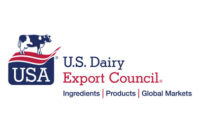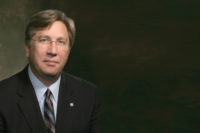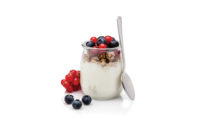
The U.S. Dairy Export Council (USDEC) has a leading role in assuring American dairy products and dairy ingredients a place in the international trade spotlight. The roughly $1 billion in U.S. dairy product exports shipped annually underscores the ability of the U.S. industry to compete on an international level, Arlington, Va.-based USDEC reports.
"The global market is challenging and complex. But government regulations on multiple fronts, labeling, shipping issues, tariffs and subsidies need not be a barrier to U.S. dairy export efforts," says Tom Suber, USDEC's president.
As world markets open up, USDEC is poised to help U.S. dairy marketers capture international recognition and sales. USDEC member benefits on a global scale include presence in major dairy export markets as well as emerging markets.
Massive European export subsidies make it difficult to compete consistently for basic dairy commodities, such as milk powder, butter and commodity cheese. Yet, USDEC reports that value-added products where price is not the sole criterion are also the most viable internationally: table and foodservice cheeses, whey, lactose, ice cream, fluid milk and cream, infant formula and milk powders. Primary export markets are Japan, Mexico and Canada. Secondary markets include China, Korea, Southeast Asia and South America, with emerging markets in the Middle East and Caribbean.
More than 85% of U.S. dairy exports are produced and exported by USDEC members. The Council was formed a decade ago as the only dairy organization of its type to serve the interests of the entire U.S. dairy industry: producers, cooperatives, processors, export traders and industry suppliers.
USDEC events at home and abroad-such as trade missions, reverse trade missions, seminars and trade shows-are designed to showcase U.S. dairy products for international dairy buyers. USDEC additionally distributes preferred supplier directories to trade partners across the globe. Efforts to create and develop dairy export markets include USDEC's far-flung network offices in Mexico, Japan, Korea, Hong Kong, China, Europe, Thailand, Taiwan, the Middle East and Brazil.
On the technical side, USDEC staff is a vital resource on country-specific labeling, technical standards, regulatory requirements, tariffs and quotas. The organization's web-based U.S. Dairy Export Guide further covers the practical aspects of market entry and international trade rules for 54 countries.
Global market penetration can be a tricky business, and USDEC offices are available to provide market data, trade contacts and leads, cultural guidance and extend to setting up meetings between U.S. exporters and key buyers.
"The path to international trade is not always smooth. When problems arise, USDEC goes to bat for members to resolve trade disputes," Suber says. "USDEC membership is like adding a team of international trade experts to your staff. We offer solutions and ideas to make export programs a success."

Sidebar:U.S. Dairy Export Council Snapshot
Mission: Enhance international demand for U.S. dairy products and assist the industry to increase the volume and value of their exports.Vision: A growing U.S. dairy industry efficiently and consistently meeting customer demands worldwide.
Members: Milk producers, dairy cooperatives, proprietary processors, export traders and industry suppliers. USDEC's 60-plus member organizations ship 85% of the $1 billion in annual U.S. dairy exports.
About USDEC: Rosemont, Ill.-based Dairy Management Inc. created and staffed USDEC as a non-profit independent organization in 1995.
Funding: DMI's dairy promotion check-off program is the primary source of USDEC funds. Export activity support and funding initiatives are additionally provided by the USDA Foreign Agricultural Service (FAS) via its Market Access Program and Foreign Market Development and Emerging Markets programs. Membership dues provide sole funding for the organization's trade policy activities. USDEC's 2004 budget was $13.3 million, including $7.5 million from dairy farmers through DMI, $4.7 million from FAS and $800,000 from membership dues and other revenue.
Contact USDEC: Phone 703/528-3049, Fax 703/528-3705, E-mail: info@usdec.org, web site: www.usdec.org


